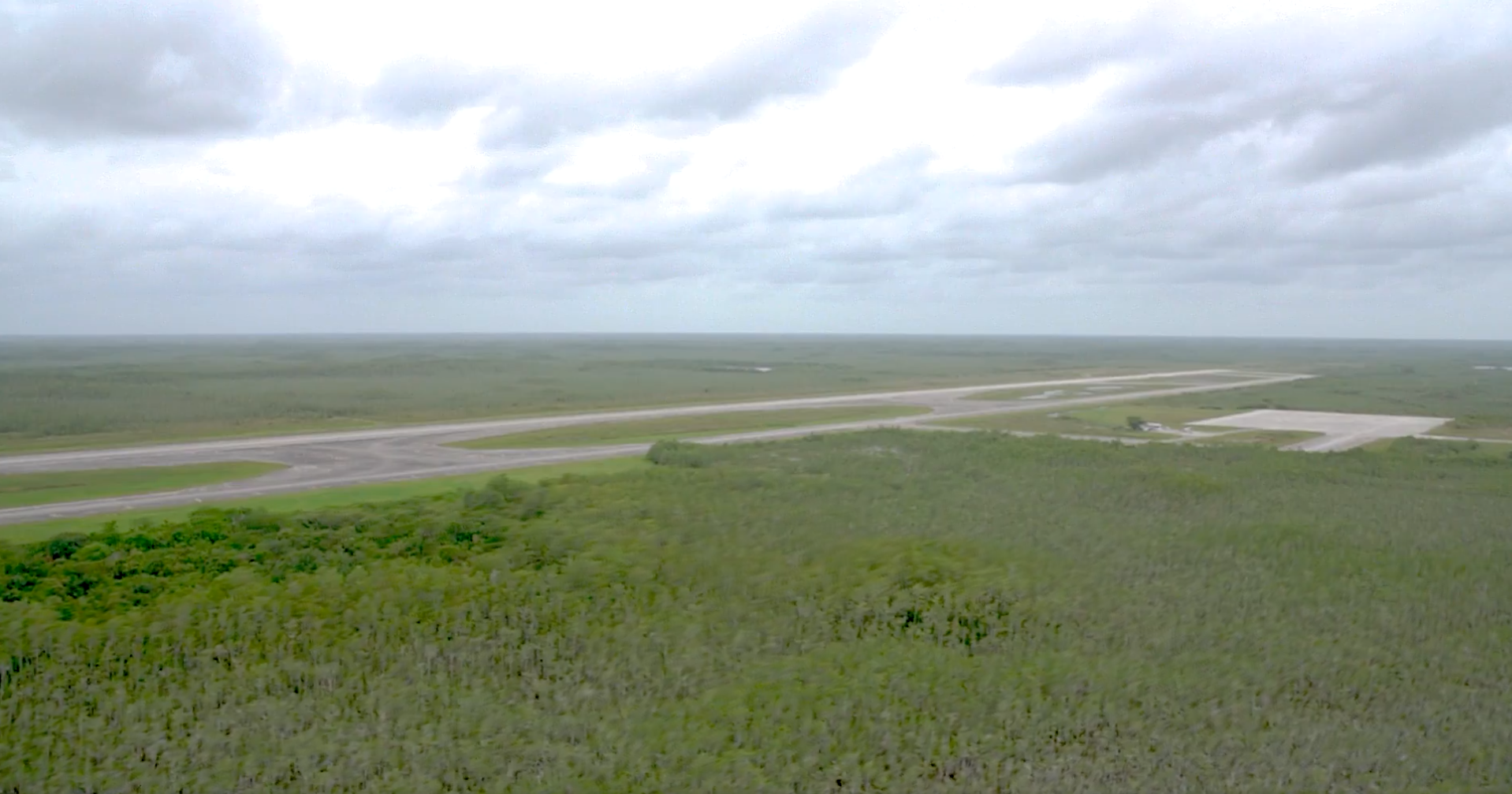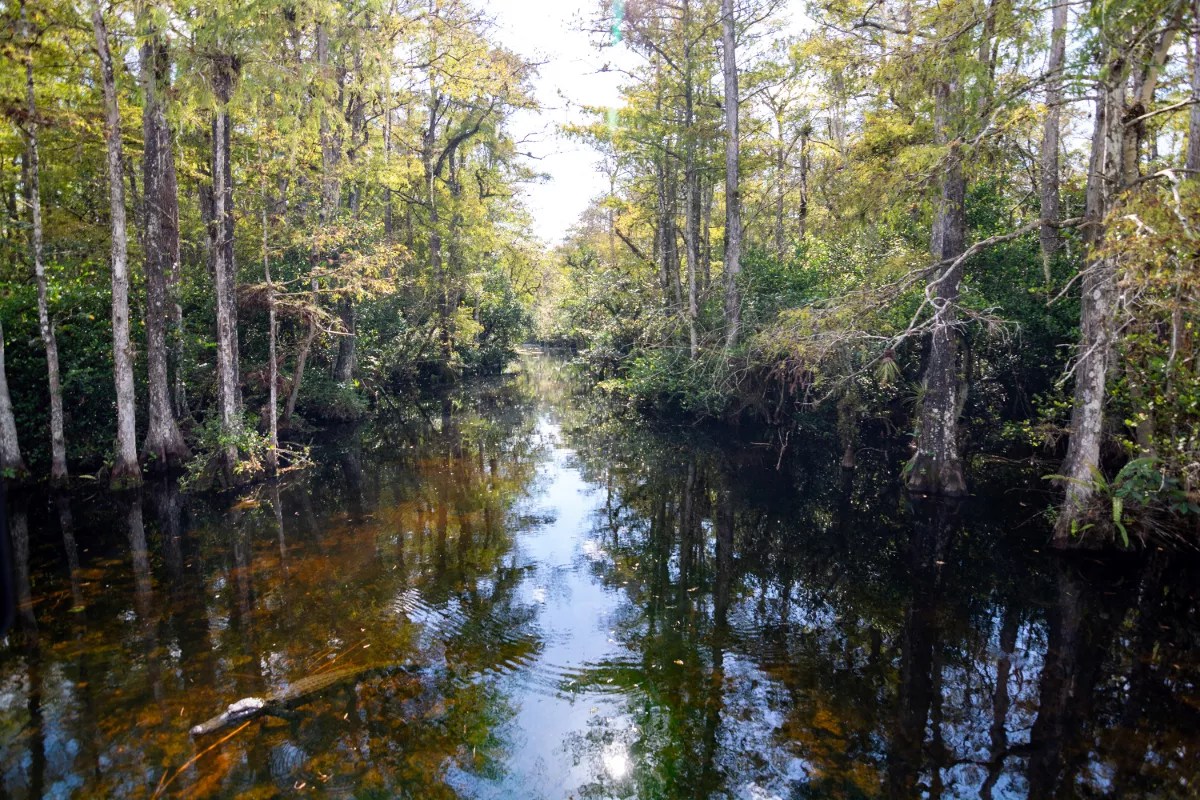
Photo by Environmental Protection Agency

Audio By Carbonatix
Decades after helping save the Everglades from a doomed jetport project, Friends of the Everglades is once again fighting to protect the precious land – this time, from an arguably more outlandish idea.
On Friday, environmental groups Friends of the Everglades and the Center for Biological Diversity announced that they filed a lawsuit against federal, state, and Miami-Dade County officials. The suit challenges what Florida Attorney General James Uthmeier has dubbed “Alligator Alcatraz”– the state’s plan to build a sprawling immigration detention facility in the middle of the Florida Everglades.
The lawsuit contends that the plan has gone through no environmental review, as required under federal law, and the public hasn’t had an opportunity to comment on the project.
“This scheme is not only cruel, it threatens the Everglades ecosystem that state and federal taxpayers have spent billions to protect,” Eve Samples, executive director of Friends of the Everglades, said in a statement. “Friends of the Everglades was founded by Marjory Stoneman Douglas in 1969 to stop harmful development at this very location. Fifty-six years later, the threat has returned – and it poses another existential threat to the Everglades.”
The 27-page lawsuit, which seeks to halt the project, was filed against U.S. Department of Homeland Security Secretary Kristi Noem, Immigration and Customs Enforcement director Todd Lyons, Florida Division of Emergency Management director Kevin Guthrie, and Miami-Dade County.
New Times has reached out to the defendants for comment.
Echoes of a Jetport Past
Back in the 1960s, as South Florida’s population boomed, the state had a seemingly bright idea: it wanted to erect the world’s largest airport on a remote stretch of swamp in the heart of the Everglades.
Located roughly 50 miles away from Marco Island, the 39-square-mile property would feature six runways and support coast-to-coast flights at supersonic speeds. The Miami-Dade County Port Authority purchased the land and broke ground in 1968; the project was also known as the Big Cypress Swamp Jetport, or simply the Everglades Jetport.
But the following year, an environmental impact report published by the United States Department of the Interior warned that the jetport could, in short, destroy the Everglades – as well as the broader South Florida ecosystem.

A 1969 report published by the U.S. Department of the Interior found that the jetport project could destroy the Everglades.
Screenshot via U.S. Department of the Interior report
Alarmed by the findings, journalist and conservationist Marjory Stoneman Douglas founded Friends of the Everglades, a nonprofit organization, to fight the construction and pressure the port authority to find another location for the airport.
“I’ll do whatever I can,” a 79-year-old Douglas said at the time, of stopping the jetport.
The group’s efforts paid off: work on the airport was halted in 1970, after just one runway was built.
Decades Later, the Fight Continues
Now, more than half a century later, Friends of the Everglades is once again fighting to save the land.
As the Trump administration continues to intensify its immigration crackdown, tripling the daily arrest quota from 1,000 to 3,000, the state quickly began construction on the land (with the federal government’s blessing) earlier this week. Uthmeier said the site will consist of “light infrastructure” in the form of “heavy duty tent facilities, trailer facilities,” hold more than 5,000 beds, and be up and running by the first week of July.

Florida Attorney General James Uthemeier says the “Alligator Alcatraz” facilities (yes, plural) will be up and running by July.
Screenshot via Attorney General James Uthmeier/X
“We don’t need to build a lot of brick and mortar,” Uthmeier said. “It will be temporary, and thankfully, Mother Nature does a lot on the perimeter. We’ll have a little bit of additions needed. But there’s really nowhere to go. If you’re housed there, if you’re detained there, there’s no way in, no way out.”
Since Uthmeier announced the plan, Friends of the Everglades and other veteran conservationists have pushed back in hopes of protecting the land and its vital ecosystems, home to countless habitats and endangered species, including the West Indian manatee, American crocodile, and Florida panther.
Days after hundreds of people gathered near the site to protest the project, Friends of the Everglades executive director Eve Samples sent Republican Gov. Ron DeSantis a letter urging him to halt the construction. She warned that the project would cause irreparable harm to the Everglades’ wetlands, as well as strain water and sewer infrastructure, increase light pollution and traffic, and burden emergency services.
“Friends of the Everglades is deeply concerned that building a detention center – along with the necessary infrastructure, and the likelihood of future development – poses an unacceptable and unnecessary risk to on-site wetlands, nearby Big Cypress National Preserve and Everglades National Park,” the letter reads.
It adds, “To be clear: Allowing the ‘Alligator Alcatraz’ proposal the move forward would signify a reversal of the DeSantis administration’s stated commitment to Everglades restoration.”

The state is building a massive immigration detention facility in the middle of Big Cypress National Preserve.
Flickr via Matthew Dillon
As the letter points out, “Alligator Alcatraz” is one of several ongoing projects currently threatening the Everglades.
Weeks ago, Florida gave U.S. Sugar Corp. and Okeelanta Corp., better known as Florida Crystals, the green light to move forward with a controversial rock mine project that would turn sugar farming land into a rock mine near the Everglades Agricultural Area (EAA) reservoir, which sits just south of Lake Okeechobee.
“It’s clear the Everglades face a new round of threats,” the letter reads. “We urge you: Don’t make the same mistake Florida avoided 55 years ago. Stand with thousands of Floridians against efforts to pave the Everglades – and be part of the fight to save it, instead.”
The group recently launched an action alert on its website urging the public to contact DeSantis and Uthmeier in opposition to the project. Samples tells New Times that thousands of messages have already been sent through the page.
“The message is clear: No airports. No rock mines. No prisons. Only Everglades,” the site reads. “Let’s not repeat the mistakes of the past. This land deserves lasting protection.”